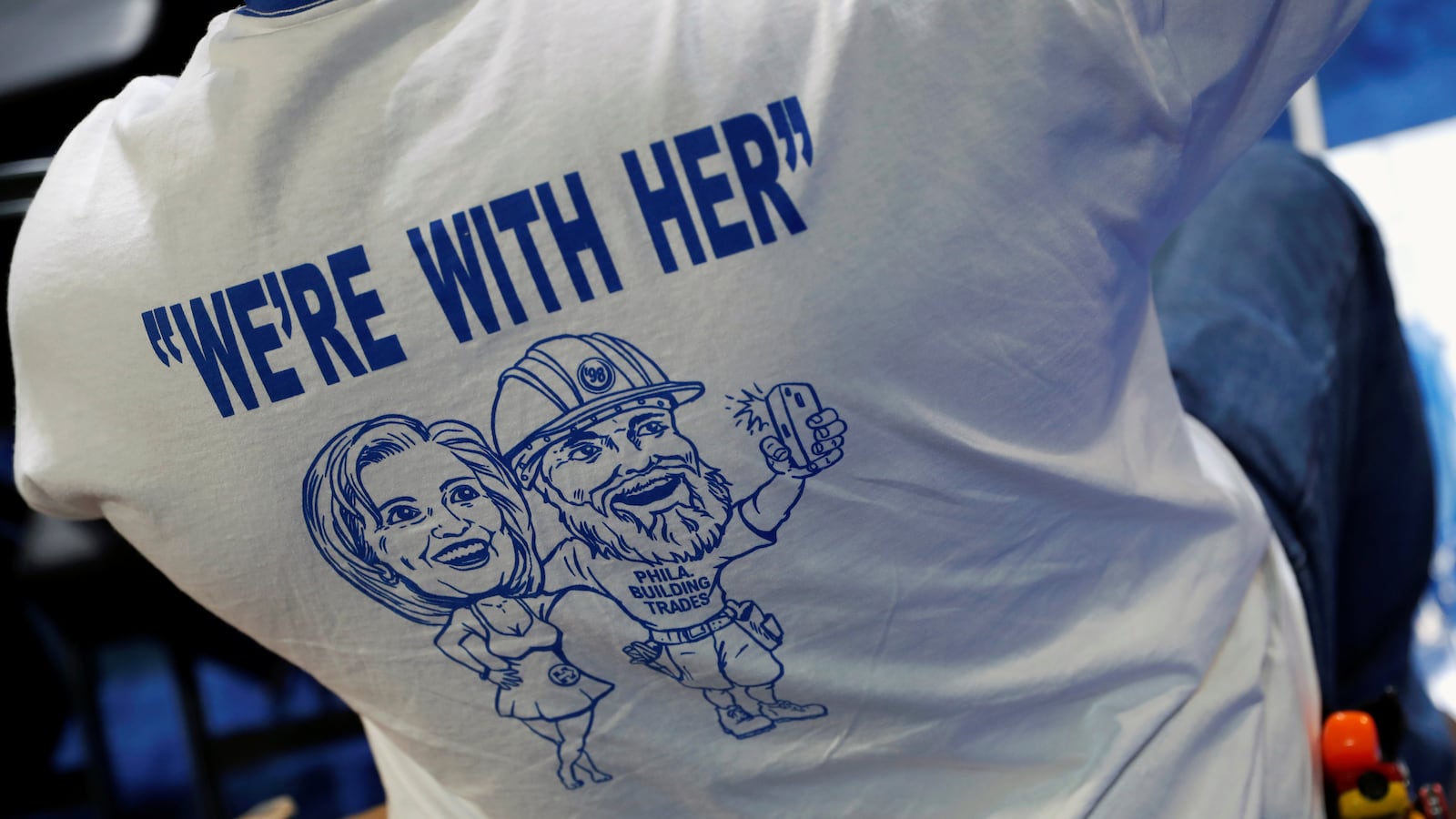David Kemper and his wife are union members and lifelong Democrats. But the Kempers and their 20-year-old son, Nicholas, are planning to vote for Donald Trump in November.
“Growing up we were very strong Democrats, but the Democrat party left us,” David Kemper said, standing at the back of a Ted Cruz barbecue near the Republican National Convention in Cleveland last week. He had traveled from Minnesota to the RNC to be with Nicholas, who was an alternate Texas delegate for Trump.
When the Kempers vote for Trump, they’ll be breaking with the leadership of their national unions, which have both endorsed Hillary Clinton for president. “I’m in the CWA, my wife is American Federation of Teachers, but we felt like the unions have left us, too,” said David Kemper.
The split between labor leaders and union members lies at the center of Trump’s potential path to the White House, which includes winning over a swath of Rust Belt states from Pennsylvania to Ohio, thanks to his cross-party appeal among traditionally Democratic union workers.
But labor leaders across the country are warning that Trump’s promises to bring back American manufacturing by ditching bad trade deals and getting tough on China are nothing more than Trump’s latest and greatest scam. The direction labor voters follow will make or break Trump’s chances in November.
Tom Conway, the international vice president of United Steelworkers union, is supporting Clinton, but he knows some rank-and-file members are considering voting for the Republican nominee.
“Trump has figured out this anger and this angst, and he’s running a campaign on it,” Conway said. “But for me personally, you look at his history. All he knows is how to manufacture offshore.”
Conway, a hulking, barrel-chested man, started working at the Burns Harbor Works of Bethlehem Steel during the Carter administration and said he’s seen union members vote Republican for many reasons over the years, including gun rights and social issues. But he views the Trump-Pence campaign as something different and uniquely dishonest.
“It’s frustrating and it just is angering that they are willing to use the position of so many people who have been hurt so badly in this economy and not come forward with a serious solution,” Conway said. “He says, ‘I’m going to fix China currency manipulation and trade, and here’s my guy who’s going to do it, Mike Pence.’ Mike Pence is the worst person you could roll forward on this issue. He’s voted for every possible trade agreement he could. He has no credibility.”
Joe Coccio, treasure of the Transport Workers’ Union Local 234 in Pennsylvania, also supports Clinton and echoed the mistrust of Trump.
“I think Hillary Clinton’s record speaks pretty loudly and her experience, as well. How can you argue with that when you have Trump, who does the complete opposite, who has no record, who has no background, and in fact has the opposite background?” he said. “Look at any of his work and any of his defunct companies.”
Like Conway, Coccio pointed to the records of Republican governors—from Pennsylvania to Wisconsin and Kansas—as examples of what he sees as the Republican Party’s long fight against workers’ rights that voters should remember in November.
“What Trump says and what the Republican Party actually does are two completely different things,” Coccio said.
A central issue for labor leaders and union members alike is international trade, which nearly all agree has led to the decimation of American manufacturing in the wake of sweeping agreements like NAFTA and CAFTA. Conway said he trusts Clinton to spike the latest trade deal, the Trans-Pacific Trade Agreement, even though she and running mate Tim Kaine both supported it in the past.
Despite leaders’ warnings, Trump seems to have found fertile territory among the workers whose factories closed in the last 15 years as jobs were shipped overseas.
His trade policies can be boiled down to a few slogans, including his promises to “get tough with China,” negotiate “great trade deals,” and bolt from the World Trade Organization. Mostly, though, he just promises that American workers are going to win.
But Gene Sperling, the national economic adviser to Presidents Clinton and Obama, argued that there is no reason to believe Trump’s promises on trade or the economy generally.
“Even if you believe he’s fighting for trade deals, why would anyone possibly think that they would be on behalf of U.S. workers, as opposed to organizations like the Trump Organization to take even more advantage of race-to-the-bottom labor and environmental policies?” Sperling said. “My question is, ‘What in his record would suggest otherwise?’ Zip.”
But Trump is clearly getting through to at least some of the blue-collar workers who voted for Democrats as recently as 2012. In six polls conducted this month, Trump leads Clinton, 58 percent to 30 percent, among white voters without a college degree, a major improvement over Mitt Romney’s performance four years ago, according to a New York Times analysis.
On an individual personal level, it rarely takes much time at a Trump or RNC event these days to find union members like the Kempers in Cleveland ready to vote against Clinton and the Democrats and their own union leadership, by casting a vote for Trump.
“The factories, I actually believe he will get those up and going again in states like Michigan, Pennsylvania, Ohio, the Rust Belt,” Nicholas Kemper said. “I think he’ll do a good job with those states.”
His dad nodded in agreement, but added, “Of course we don’t have a track record with him,” he said. “So we don’t really know.”






